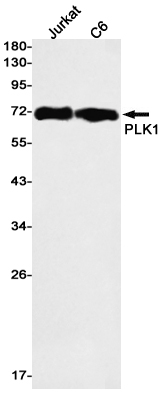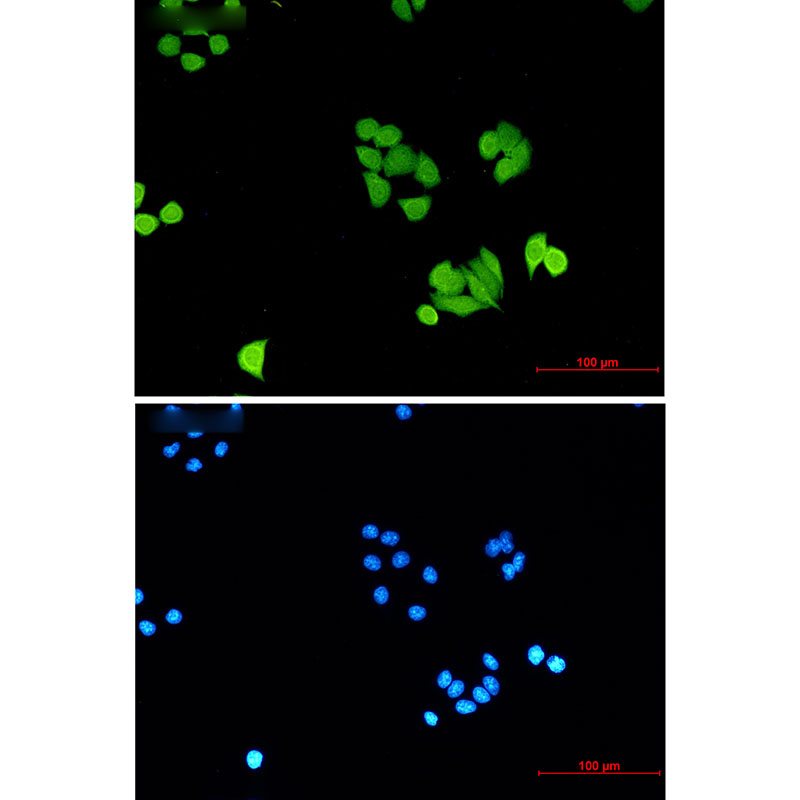

| WB | 1/500-1/1000 | Human,Mouse,Rat |
| IF | 1/20 | Human,Mouse,Rat |
| IHC | 咨询技术 | Human,Mouse,Rat |
| ICC | 1/50-1/200 | Human,Mouse,Rat |
| FCM | 咨询技术 | Human,Mouse,Rat |
| Elisa | 咨询技术 | Human,Mouse,Rat |
| Aliases | PLK1; PLK; Serine/threonine-protein kinase PLK1; Polo-like kinase 1; PLK-1; Serine/threonine-protein kinase 13; STPK13 |
| Entrez GeneID | 5347 |
| WB Predicted band size | Calculated MW: 68 kDa; Observed MW: 68 kDa |
| Host/Isotype | Rabbit IgG |
| Antibody Type | Primary antibody |
| Storage | Store at 4°C short term. Aliquot and store at -20°C long term. Avoid freeze/thaw cycles. |
| Species Reactivity | Human,Rat |
| Immunogen | A synthetic peptide of human PLK1 |
| Formulation | Purified antibody in TBS with 0.05% sodium azide,0.05%BSA and 50% glycerol. |
+ +
以下是关于PLK1抗体的示例参考文献(仅供参考,建议通过学术数据库核实原文):
---
1. **文献名称**: *"A Monoclonal Antibody Against Polo-like Kinase 1 (PLK1) for Targeted Cancer Therapy"*
**作者**: Strebhardt K. et al.
**摘要**: 本研究开发了一种针对PLK1的单克隆抗体,通过抑制其激酶活性阻断肿瘤细胞的有丝分裂。实验表明,该抗体在体外和异种移植模型中显著抑制多种癌细胞的增殖,且对正常细胞毒性较低。
2. **文献名称**: *"PLK1-Specific Antibody-Drug Conjugate Demonstrates Preclinical Efficacy in Solid Tumors"*
**作者**: Gjertsen B.T. et al.
**摘要**: 研究者构建了一种PLK1抗体-药物偶联物(ADC),通过靶向降解PLK1蛋白并释放化疗药物。在卵巢癌和结直肠癌模型中,该ADC显著缩小肿瘤体积,为PLK1靶向治疗提供了新策略。
3. **文献名称**: *"Epitope Mapping of Anti-PLK1 Antibodies Reveals Critical Functional Domains"*
**作者**: Lens S.M.A. et al.
**摘要**: 通过表位定位分析,揭示了PLK1抗体结合的关键区域与其激酶活性的相关性。研究发现,靶向PBD(Polo-box结构域)的抗体可有效干扰PLK1的亚细胞定位,从而抑制肿瘤进展。
4. **文献名称**: *"Clinical Validation of PLK1 as a Biomarker Using Immunohistochemistry in Breast Cancer"*
**作者**: Winters Z.E. et al.
**摘要**: 研究利用PLK1特异性抗体进行乳腺癌组织免疫组化分析,发现PLK1高表达与患者生存率低显著相关,支持其作为预后标志物和治疗靶点的潜力。
---
**注意**:以上为模拟示例,实际文献需通过PubMed/Google Scholar等平台检索(关键词:PLK1 antibody, therapeutic targeting)。
PLK1 (Polo-like kinase 1) is a serine/threonine-protein kinase central to cell cycle regulation, particularly in mitotic entry, centrosome maturation, and cytokinesis. Its overexpression is strongly linked to cancer progression, poor prognosis, and therapeutic resistance, making it a prominent oncology research target. PLK1 antibodies are critical tools for studying its expression, localization, and functional roles in both normal and pathological conditions. These antibodies enable detection via techniques like Western blotting, immunohistochemistry (IHC), and immunofluorescence (IF), aiding in biomarker validation and mechanistic studies.
In drug development, PLK1 inhibitors are explored as anticancer agents, and PLK1 antibodies serve to monitor target engagement, assess pharmacodynamic effects, or stratify patients in clinical trials. Commercially available antibodies target specific PLK1 domains or phosphorylation sites (e.g., Thr210), with validation across species and applications being essential due to potential cross-reactivity with other PLK family members (PLK2-4). Challenges include ensuring specificity, as nonspecific binding may confound experimental outcomes. Recent advances in antibody engineering have improved affinity and reproducibility, supporting their use in high-throughput screening and companion diagnostics. Ongoing research focuses on optimizing PLK1-targeted therapies and understanding resistance mechanisms, where high-quality antibodies remain indispensable for translational and basic science investigations.
×